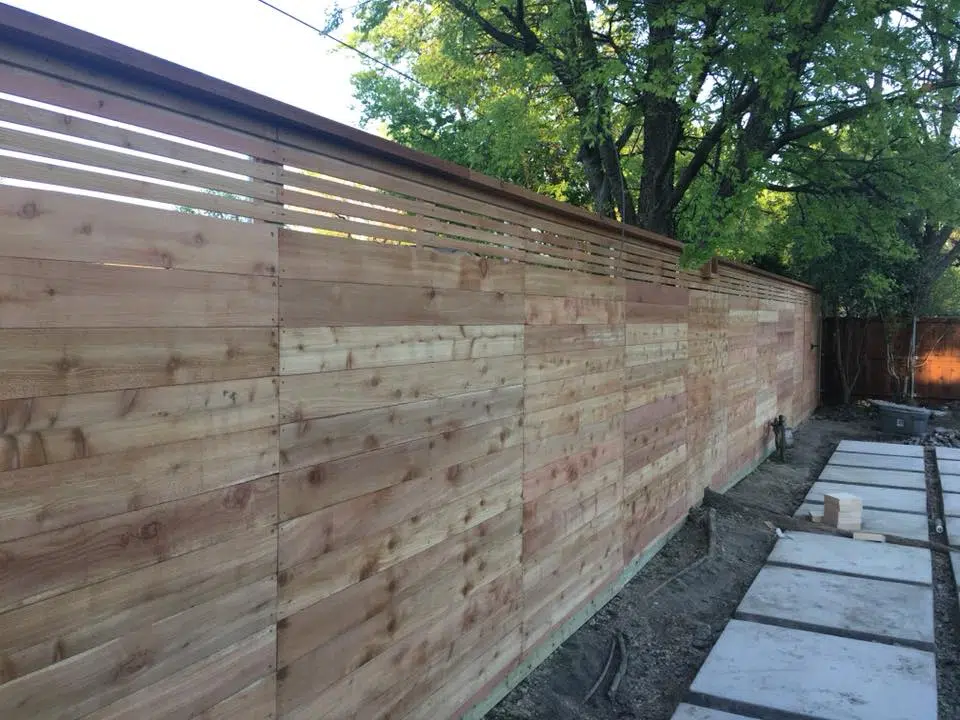P (972) 898-1307 | F (972) 499-1188
Types of Weather that Can Damage Your Fence

Here at Texas State Fence, we’re familiar with the unique challenges that Dallas weather presents to our fences. With our expertise and experience in providing solutions for various fence types, we want to share insights into the types of weather that can damage your fence and how best to prevent these issues.
Sunlight and Your Fence
The first line of offense comes from the sky. Dallas, Texas, enjoys abundant sunshine, which, while generally pleasant, can be harsh on your wooden fences. Over time, exposure to intense UV rays can cause significant damage, warping and fading the wood. This is particularly true for fences not treated with UV-resistant fence products. A key part of maintaining the health and look of your wood fence involves regularly applying UV-resistant products. This simple st significantly dramatically reduces the risk of sunlight damage, keeping your fence looking its best.
Rain: A Persistent Foe
One might not immediately think of rain as a potential enemy of a sturdy fence. Yet, rain damage is a real issue for fences in Dallas, especially those made of wood. Heavy rains can cause wooden fences to rot, damaging the fence’s structural integrity. Even our tough metal fences and resilient vinyl fences aren’t exempt from the effects of excessive moisture. Large rainwater accumulations can lead to rust and mildew, particularly at the base of the fence posts. Regular inspection and maintenance and applying the appropriate protective products can guard your fence against the effects of frequent rain.
Dallas’ Winds: An Unseen Threat
Dallas is no stranger to high winds. A gusty wind can shake fence posts loose, and strong winds can send debris hurtling toward your fence. This kind of wind damage isn’t just unsightly; it can also weaken the structural integrity of your fence. Regularly checking your fence posts for stability and immediately replacing damaged parts is crucial. And don’t forget about wind-blown debris. Keeping the area around your fence clear of wind-blowing debris and making any necessary repairs can help minimize potential damage.
Snow and Cold: The Winter Challenge
Winter brings its challenges to Dallas fences. Cold weather can cause materials to contract, leading to cracks and other damage. Heavy snowfall adds weight to your fence, warping or snapping fence posts under large accumulations. Regularly brushing snow off your fence during the colder months is vital to protect and alleviate this pressure.
When Hail Storms Strike
We all know how a hail storm can wreak havoc in our Dallas yards, and your fence is not immune. Hail can cause severe damage to all types of fences, whether made of wood, vinyl, or metal. Regular inspection after hail storms can ensure any damage is quickly dealt with, preventing further deterioration.
Falling Tree Branches and Other Debris
In bad weather conditions, tree branches can break off, and other debris can become airborne, causing serious damage to your fence. Regular trimming of trees near your fence can reduce the risk of further damage.
Ensuring Your Fence’s Longevity
Choosing the correct type of fence material and keeping up with regular maintenance can greatly influence how well your fence can stand up to Dallas’ varied weather conditions. Different materials have strengths and weaknesses, from wood fences to vinyl fencing. Furthermore, UV-resistant fence products, sealants, and other protective measures can add years to your fence’s life.
Wooden Fences: A Classic Choice
Wooden fences can be a great choice, whether pressure-treated or made from naturally resistant wood or other wood fence types. Regular maintenance, including sealing and staining, can help keep your wood fence resistant to weather damage.
Vinyl Fences: A Low-Maintenance Option
A vinyl fence is generally more resistant to weather damage than wooden fences. They won’t rot or rust and can withstand most weather conditions, even wind, making them a low-maintenance option.
Metal Fences: Built to Last
Metal fences, especially those made of high-quality material, are highly durable and resistant to most weather damage. But for most fences, to ensure longevity, they must be properly installed and maintained to prevent rust and other potential issues.
Contact Texas State Fence Today!
Our weather in Dallas can be harsh on fences, but with suitable materials and diligent care, your fence can remain sturdy and attractive through every season. Whether you’re considering an entire fence replacement or looking to extend the life of your current one, Texas State Fence is here to help. Contact us today for more information on our range of fencing materials and professional services.
FAQ’s
Q: How often should I maintain my fence to prevent weather-related damage?
A: We recommend inspecting your fence at least twice a year, ideally in the spring and fall. This can help catch any damage early before it worsens. More frequent checks may be needed after severe weather events or in periods of extreme heat, rain, or heavy snow.
Q: I have a metal fence. Do I still need to worry about weather damage?
A: While metal fences are generally more resilient to weather conditions compared to other types, they can still suffer from weather-related damage. For instance, rust can be an issue, especially if the fence is regularly exposed to rain or high humidity. Regular maintenance is key to preventing such problems.
Q: What is the most weather-resistant type of fence material?
A: Each material has its strengths and weaknesses regarding weather resistance. Vinyl fencing, for example, doesn’t rot or rust, make an an excellent choice for areas with high rain, snow, or humidity. On the other hand, metal fences can be very durable and resistant to wind damage. Wood fences can also be quite resilient when adequately treated and maintained. The best choice often depends on your specific situation and needs.
Q: Is there any special preparation I should do before a forecasted severe weather event to prevent fence damage?
A: Preparing to protect your fence well before a severe weather event is always a good idea. For instance, you could check for loose or damaged components and make necessary repairs. Clearing nearby trees and removing potential flying debris can also help prevent damage. Consider applying a protective sealant to your fence for snow and ice storms to repel moisture.

